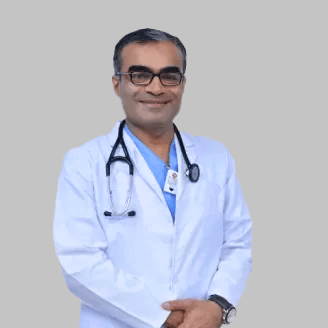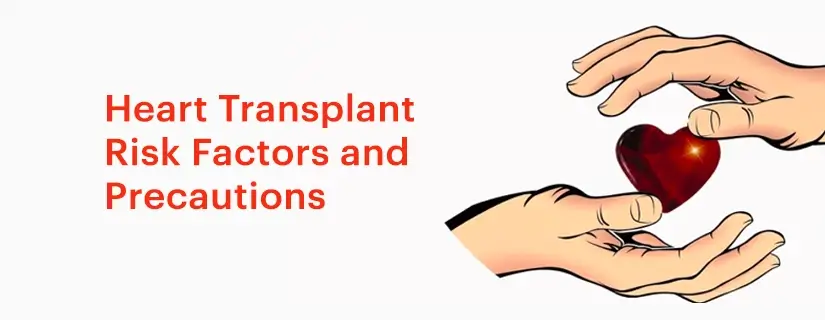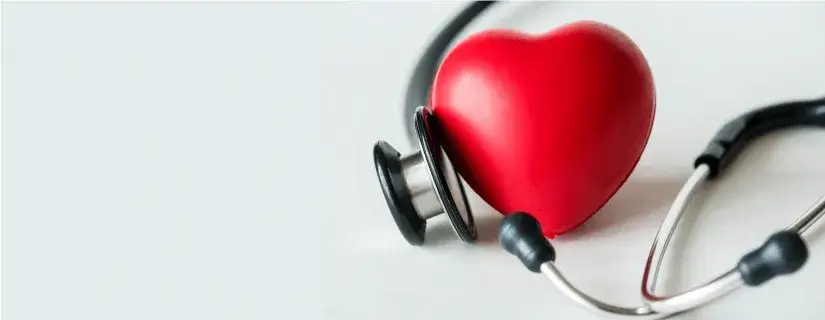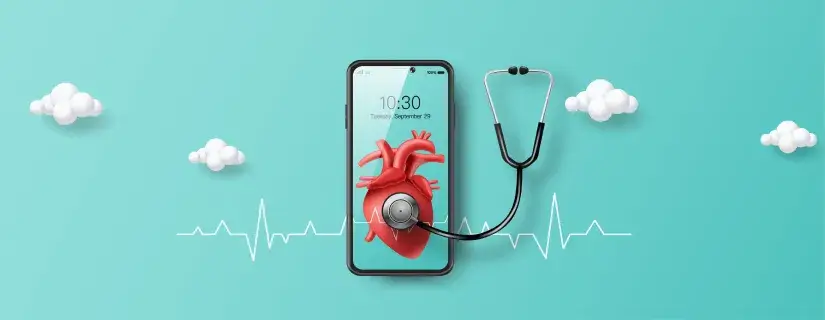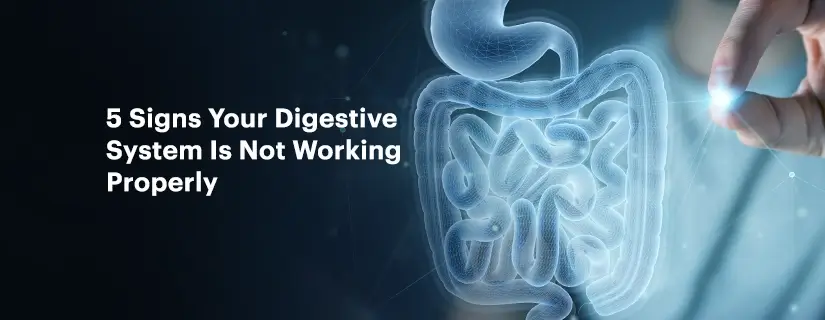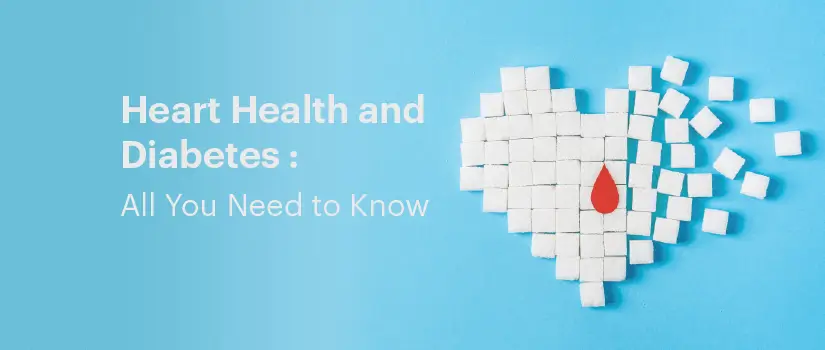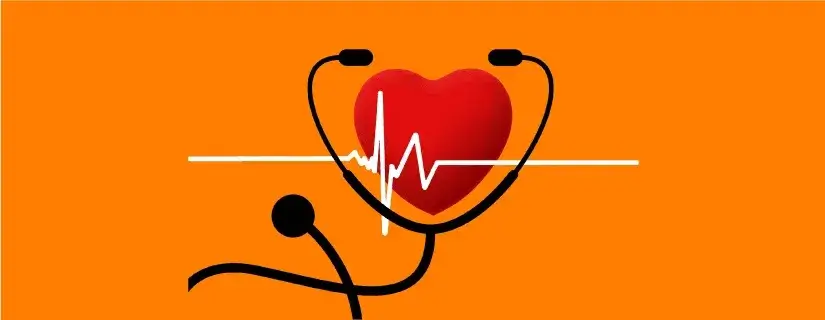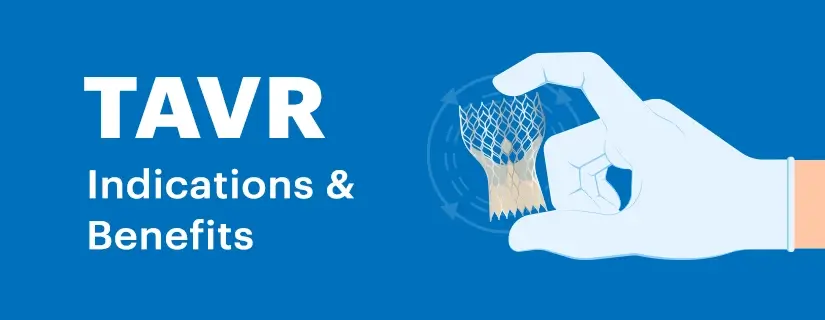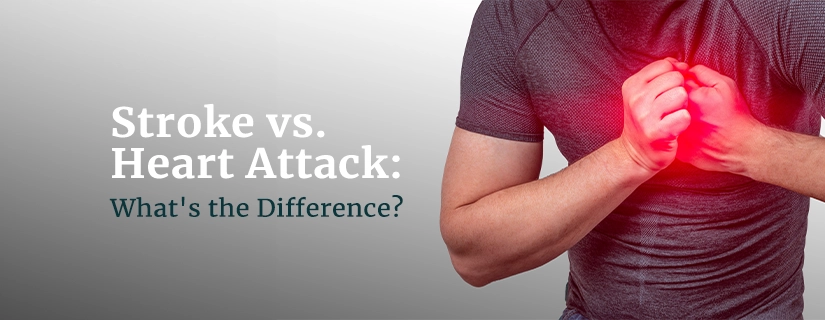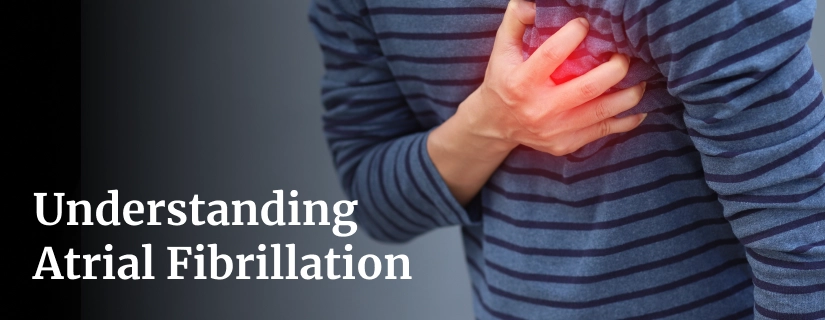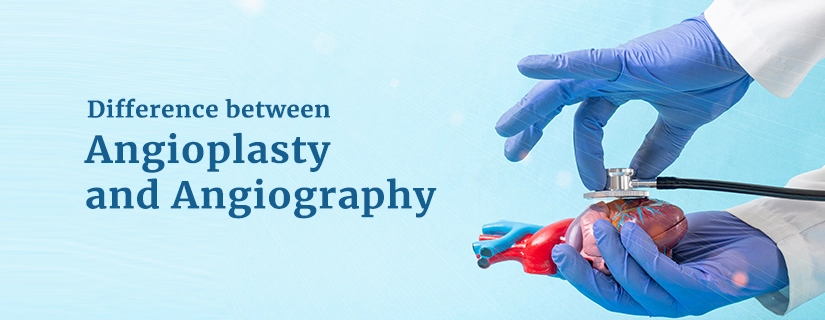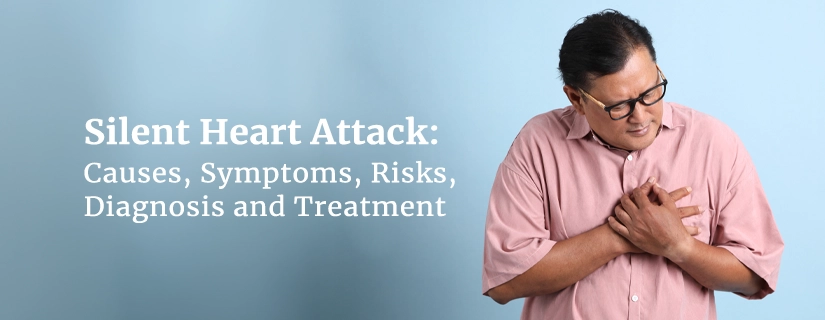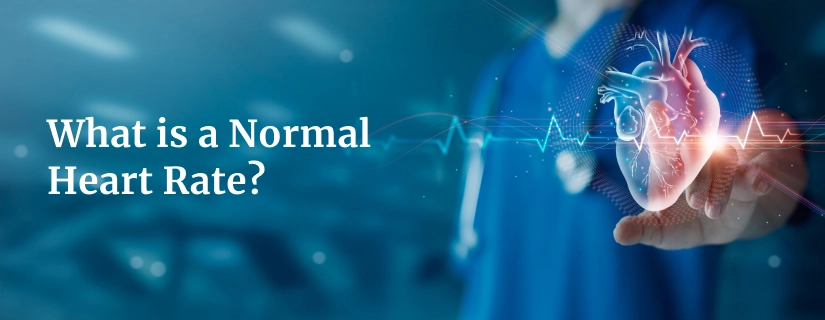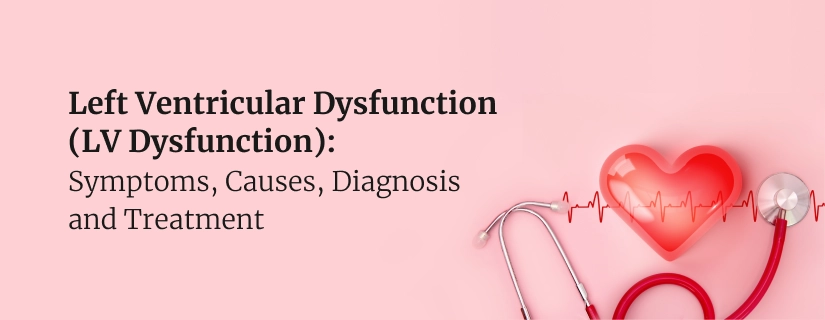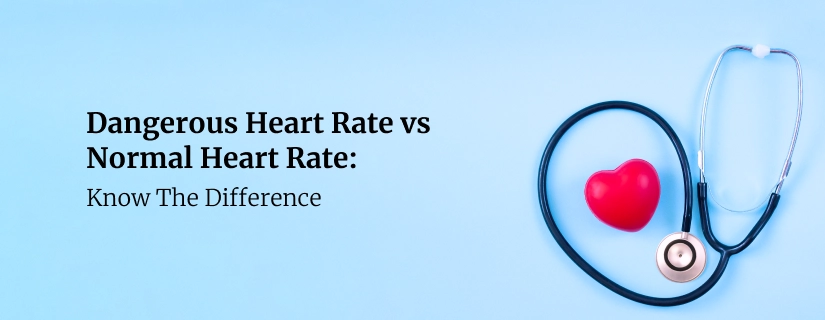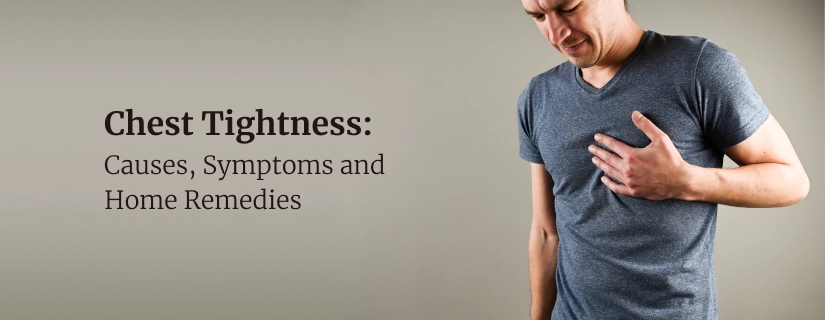-
Doctors
-
Specialities & Treatments
Centre of Excellence
Specialties
Treatments and Procedures
Hospitals & Directions HyderabadCARE Hospitals, Banjara Hills CARE Outpatient Centre, Banjara Hills CARE Hospitals, HITEC City CARE Hospitals, Nampally Gurunanak CARE Hospitals, Musheerabad CARE Hospitals Outpatient Centre, HITEC City CARE Hospitals, Malakpet
HyderabadCARE Hospitals, Banjara Hills CARE Outpatient Centre, Banjara Hills CARE Hospitals, HITEC City CARE Hospitals, Nampally Gurunanak CARE Hospitals, Musheerabad CARE Hospitals Outpatient Centre, HITEC City CARE Hospitals, Malakpet Raipur
Raipur
 Bhubaneswar
Bhubaneswar Visakhapatnam
Visakhapatnam
 Nagpur
Nagpur
 Indore
Indore
 Chh. Sambhajinagar
Chh. SambhajinagarClinics & Medical Centers
Book an AppointmentContact Us
Online Lab Reports
Book an Appointment
Consult Super-Specialist Doctors at CARE Hospitals
CAD, Triple Vessel Disease (TVD) Does Not Mean the Patient Will Need Bypass Surgery
Updated on 26 September 2023
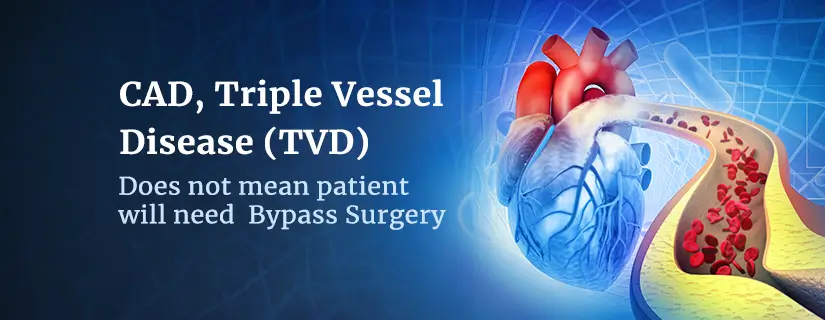
Triple Vessel Disease is a serious condition of the heart. It is a type of Coronary Artery Disease (CAD) with blockages in all three major blood vessels that supply the heart with blood.
TVD is essentially caused by the hardening or clogging of the arteries due to a condition called atherosclerosis. This can happen due to poor lifestyle habits including lack of exercise, poor eating habits, obesity, diabetes, smoking, etc.
Symptoms of TVD
Symptoms of triple vessel coronary artery disease mimic those of CAD, such as:
- Fatigue: Persistent tiredness or lack of energy.
- Confusion: Difficulty concentrating or thinking clearly.
- Difficulty Breathing: Shortness of breath, especially during physical activity or at rest.
- Chest Pain: Discomfort or pressure in the chest that may radiate to the shoulders, arms, neck, jaw, or back.
- Irregular Heart Rate: Palpitations or awareness of abnormal heartbeats.
- Heartburn: Burning sensation in the chest or upper abdomen.
- Sensation of Choking: Feeling of tightness or constriction in the throat or chest.
- Nausea: Feeling sick to the stomach or queasy.
- Vomiting: Forceful expulsion of stomach contents through the mouth.
- Dizziness: Feeling lightheaded or unsteady.
- Discomfort in the Back, Neck, Arms, Shoulders, or Jaw: Aching, pressure, or pain in these areas, is often associated with chest discomfort.
Detection of TVD
TVD can be detected by a variety of tests. These mainly include:
- Cardiac catheterization (Coronary angiography)
- CT Coronary Angiogram
Treatment Approach
Treatment aims to enhance blood flow, ease the strain on the heart, and halt or reverse arterial plaque buildup.
Your specific treatment will hinge on factors like overall health, concurrent medications, and response to therapy. Common approaches include:
- Beta-blockers or calcium channel blockers for blood pressure control.
- Vasodilators to relax artery walls.
- Procedures like balloon angioplasty or coronary artery bypass grafting to open blocked arteries.
- Adopting lifestyle changes such as regular exercise, heart-healthy eating, smoking cessation, and maintaining a healthy weight.
CABGs or Angioplasty for Triple Vessel Disease?
If someone is diagnosed with Triple Vessel Disease, it does not mean that CABGs is necessarily the treatment modality advised. Doctors can opt for angioplasty or CABGs depending on the number and location of blockages in the heart and the pumping capacity of the heart.
A score known as the syntax score is used by cardiologists as a tool to assess the complexity of coronary artery lesions. If the syntax score is less meaning the blockages are simple, angioplasty can be equally effective as CABGs. However, if there are more complex blocks, CABGs is more effective than angioplasty.
Recent studies have shown that patients with Triple Vessel Disease do not necessarily have to go through CABGs. PTCA or CABGs can be advised as a treatment modality depending on the individual condition of the patients.
Who is at risk for the disease?
People at risk for CAD (Coronary Artery Disease) and Triple Vessel Disease (TVD) include:
- Those with hypertension
- People with a family history of heart disease
- Smokers
- People who are obese or overweight
- Those who lead a sedentary lifestyle
- People with diabetes or insulin resistance
Methods of Detecting the Triple Vessel Disease
Detecting triple vessel coronary artery disease involves:
- Coronary Angiography: Uses dye and X-rays to view blockages in heart arteries.
- Stress Testing: Checks heart function during exercise or with medication.
- Electrocardiogram (ECG): Records the heart's electrical activity for irregularities.
- Echocardiography: Uses sound waves to create heart images.
- CT Angiography: X-rays and computers create detailed heart and artery images.
- MRI: Uses magnets and radio waves for detailed heart scans.
- Fractional Flow Reserve (FFR): Measures blood flow in specific heart arteries during angiography.
Conclusion
Triple Vessel Disease is a serious medical condition and an extreme form of Coronary Artery Disease. However, it is possible to minimize the risk and prevent such diseases by opting for a healthier lifestyle.
In case a patient has symptoms mentioned above, they must consult a cardiologist and explore their options. When diagnosed with TVD or any other form of CAD, the choice between CABGs and Angioplasty is integral to the outcome of the disease. Essentially the choice depends on many factors and with recent technological development more invasive CABGs may not be necessary or even advised. The choice will mainly be based on the cardiologist's and patient’s preference as well as the patient’s condition. These include diabetes, heart failure with narrowing of arteries, the feasibility of revascularization, etc.
In conclusion, a cardiologist will thoroughly examine the patient and make an informed choice. Although CABGs may be the course of treatment in many patients, it may not always be prescribed and the course of treatment can be through Angioplasty as well.
FAQs
1. What is triple vessel disease?
Triple vessel disease (TVD) refers to a condition where all three of the major coronary arteries supplying blood to the heart are narrowed or blocked, reducing blood flow and potentially leading to chest pain (angina) or heart attacks.
2. Can triple vessel disease be stented?
Yes, triple vessel disease can be treated with stenting. This involves inserting a small mesh tube (stent) into the narrowed or blocked coronary artery to restore blood flow. Stents can be placed during procedures like percutaneous coronary intervention (PCI).
3. How long can a person live with triple vessel disease?
The life expectancy for someone with triple vessel disease depends on various factors including overall health, extent of coronary artery disease, treatment received, and adherence to medical advice. With appropriate treatment and lifestyle modifications, many people can live a full life despite having triple vessel disease.
4. How is triple vessel disease treated?
Treatment may involve medications to manage symptoms and reduce plaque buildup, lifestyle changes (diet, exercise, smoking cessation), procedures like stenting or CABG to improve blood flow, and ongoing medical management to prevent complications.
5. Can triple vessel disease be cured without surgery?
While triple vessel disease cannot be "cured" in the traditional sense, it can be effectively managed and treated without surgery through lifestyle changes, medications, and minimally invasive procedures like stenting. Surgery such as CABG may be necessary in more severe cases.
6. What is the diet for triple vessel disease?
A heart-healthy diet for triple vessel disease usually includes:
- Plenty of fruits and vegetables
- Whole grains
- Lean proteins (such as fish, poultry, beans, and nuts)
- Low-fat dairy products
- Limiting saturated fats, trans fats, cholesterol, sodium, and added sugars
- Avoiding processed foods and excess salt
To Book an Appointment, call:
ENQUIRY FORM
SELECT CATEGORIES
-
Neurosciences (16)
-
Neurology (37)
-
Neurosurgery (14)
-
Orthopaedics (48)
-
Oncology (33)
-
Obstetrics and gynecology (51)
-
Pulmonology (23)
-
Urology (20)
-
Nephrology (13)
-
Psychiatry (7)
-
Dietetics and Nutrition (111)
-
General Medicine (63)
-
Cardiac Sciences (30)
-
Vascular & Endovascular Surgery and Interventional Radiology (10)
-
Gastroenterology (46)
-
Endocrinology (23)
-
Plastic Surgery (10)
-
Critical Care Medicine (5)
-
COVID-19 (16)
-
Dermatology (16)
-
Emergency Care (1)
-
Ophthalmology (4)
-
Pediatrics (14)
-
Laparoscopic and Bariatric Surgery (8)
-
ENT (15)
-
Kidney Transplant (1)
-
Liver Transplantation and Hepatobiliary Surgery (5)
-
General Surgery (3)
-
Internal Medicine (5)
-
Medicine Information
Does a Family History of Heart Attacks Increase your Risk?
What are the reasons for Heart Attack in women and How to prevent them?
YOU MAY ALSO LIKE
RECENT BLOGS
-

Direct Anterior Approach in Total Hip Replacement: Advantages and Challenges
10 April 2025
Read More
-

Zinc Deficiency: Signs and Symptoms, Causes, Treatment
9 April 2025
Read More
-

Chest Pain When Coughing: Causes, Treatment and Home Remedies
9 April 2025
Read More
-

12 Health Benefits of Eating Mushrooms
8 April 2025
Read More
-

7 Health Benefits of Blood Donation You Should Know About
8 April 2025
Read More
-

Implantation Bleeding Vs Periods: Know the Difference
28 February 2025
Read More
-

Bloating During Ovulation: Symptoms, Causes and Remedies
28 February 2025
Read More
-

Itching During Dengue: Causes, Treatment and Home Remedies
18 February 2025
Read More
Have a Question?
If you cannot find answers to your queries, please fill out the enquiry form or call the number below. We will contact you shortly.


